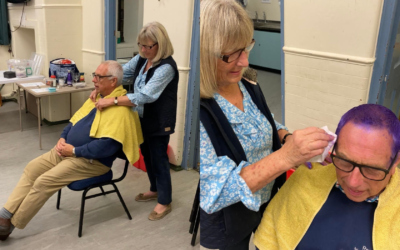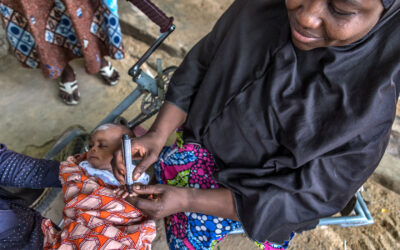The British Rotarian, who has become one of the leading lights globally in the fight against polio, has said that news of Nigeria passing the three-year period of being polio-free should provide impetus to finish the job.
Maidenhead Thames Rotarian, Judith Diment, is a member of Rotary International’s PolioPlus Committee (IPPC) and is also Rotary’s Representative to the Commonwealth.
She said she was delighted to hear the news that Nigeria was on the brink of being declared polio-free – that is expected to happen, if no new cases occur, by mid-2020 – but it was also tinged with a sense of relief.
“My initial reaction was great relief, as I remember only too well the disappointment in 2016 when the four cases were announced in Nigeria after nearly three years of no cases, and what a setback that was,” she reflected.
“I also felt delight for my colleague on the IPPC, Dr Tunji Funsho, who works tirelessly in Nigeria on the polio programme and who is a real inspiration.”
Judith described last month’s news from Nigeria as “a significant milestone” since it was the last country in Africa with polio cases.
She said that Nigeria’s success served as an example of what can be achieved when governments work with the Global Polio Eradication Initiative (GPEI) partners and take ownership of the polio programme.
Rotary volunteers and community health workers in Nigeria have been instrumental in raising awareness for polio eradication in the country. Learn more about their efforts: https://t.co/z0kJePZJGI pic.twitter.com/6z1dxjj4XA
— EndPolioNow (@EndPolioNow) September 5, 2019
Judith added: “The Nigerian government used the military to good effect to gain control of many towns which were under the control of Boko Haram, which in turn allowed access to the children to be vaccinated.
“The UK government gave substantial aid for nutrition for the children in the areas controlled by Boko Haram, which helped boost the children’s immune systems and the effectiveness of the polio vaccination programme.
“Clean water installations in Pakistan, sponsored by Coca-Cola, are having a similar effect in Pakistan.”
However, with Nigeria close to being declared polio-free, there is still work to be completed in Pakistan and Afghanistan, the remaining two bastions where the wild poliovirus remains rife.
And with the world being so close to ensuring it becomes polio-free, Judith insisted that Rotarians and its partners could not afford to take their foot off the pedal.
Judith added: “We need to work very hard to ensure that complacency doesn’t set in as we now need a huge effort, with a sense of urgency, to ensure that we maintain the polio-free status in Africa, and to help Pakistan and Afghanistan achieve the same.
“This will put pressure on the governments of these countries to ensure that they will also become polio-free.
“In Pakistan, the government is taking ownership of the polio programme and has recently launched a major advertising campaign to encourage parents to vaccinate their children.”
A new GPEI strategy for the next four years was recently unveiled. The success in Nigeria can be used as a springboard towards ensuring this strategy is delivered.
Judith said the focus now is to raise the $3.2 billion required to implement the global strategy through to 2023.
She and others are currently involved in advocacy efforts to governments, corporate businesses and philanthropists to hit that target, culminating with a pledging moment in Abu Dhabi, hosted by the Crown Prince, Mohammed bin Zayed Al Nahyan, on November 19th.
Now is not the time to be complacent, but to pull out all the stops to ensure we help raise our share of the $50 million a year, to ensure that we do end polio.”
Before then, on September 9th, the Abu Dhabi Health Minister will be hosting a meeting of ambassadors at the World Health Organization in Geneva, Switzerland, to ask their governments to make a pledge at the Gulf meeting in November.
“Our focus now is implementing the new four-year strategy, and an all-out effort to get to the last cases in Pakistan and Afghanistan,” explained Judith.
“This is already happening with a new World Health Organization hub in the Middle East, led by Hamid Jafari, who was instrumental in India becoming polio-free.
“A new Health Minister in Pakistan and the support of the military there will also be important.
“And we will be integrating the polio programme into broader health provision together with clean water and nutrition.
“In November, I will be making a presentation on the investment case for the polio strategy on behalf of Rotary International and the GPEI.”
Nigeria has now gone 3 years w/out wild polio, opening the door for the @WHOAFRO to be certified wild polio-free in 2020. But @Rotary’s @dr_funsho reminds us it is “vital now to guard against any sense of complacency.” #EndPolio @annegulland @Telegraph https://t.co/tM4HfPsouB
— Rotary International (@Rotary) August 21, 2019
Judith continued, “Rotary’s commitment is $50 million a year, matched two to one by the Bill & Melinda Gates Foundation.
“The message for Rotary in Great Britain & Ireland is that every Rotary club has a vital role to play in ensuring we reach this target.
“The last few years has seen the number of clubs in Rotary GBI giving to polio decline, and we are not meeting the Rotary International challenge.
“Now is not the time to be complacent, but to pull out all the stops to ensure we help raise our share of the $50 million a year, to ensure that we do end polio.”










